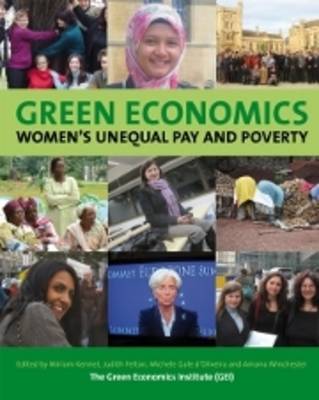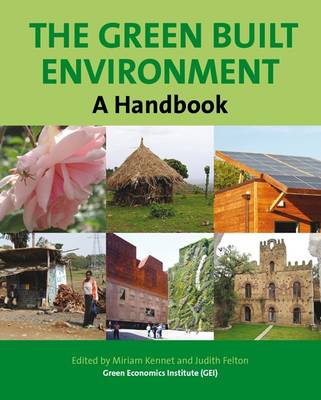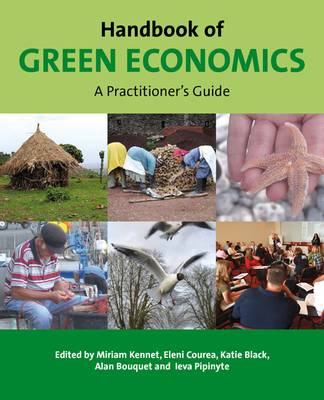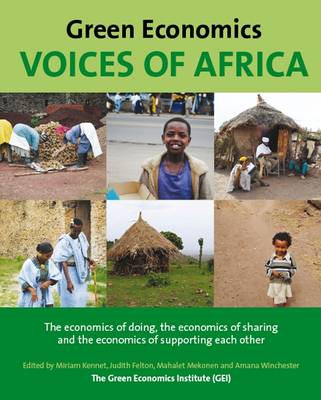Green Economics Institute Handbook
1 primary work • 4 total works
Book 5
Green Economics:Women's Unequal Pay and Poverty
by Miriam Kennet, Judith Felton, and Michele Gale D'Oliveira
Published 10 February 2012
Women form half the world's population, but are enormously under represented politically, almost everywhere, and this is one key factor, along with women's education, that needs to change urgently to rectify these huge imbalances. The book is designed to introduce the reader to the green ideas for change and diversity and inclusion that are sweeping round the world as green economics which has gender inclusion and equality at its core. The book explores themes of the costs of women's inequality, unequal pay, education and democracy deficits and also the important movements for change such as the protests and the arab spring - as well as the issues of the changing status quo such as the increasing importance of sovereign wealth funds and power and state capitalism as well as sovereigh debt of devastating levels. A unique geography of gender issues is provided with voices from all around the globe from China to Africa to India and South America giving a truly inclusive perspective from those most affected. The final section deals with implementation of inclusive policies and diversity and the practicalities of this process.This book is designed to help ease this process and ensure that women in the 21st century, throughout the world, can achieve their full potential.
It is also designed to inspire the reader to get involved in this process and help to create a viable, vibrant and equitable society, for a secure future, for all of humanity in the 21st century. Women's economic power is, however, gradually increasing and there is now, for the first time, a woman at the head of the International Monetary Fund and the first woman ever won the Nobel Prize for Economics last year.
It is also designed to inspire the reader to get involved in this process and help to create a viable, vibrant and equitable society, for a secure future, for all of humanity in the 21st century. Women's economic power is, however, gradually increasing and there is now, for the first time, a woman at the head of the International Monetary Fund and the first woman ever won the Nobel Prize for Economics last year.
Handbook of Green Economics
by Miriam Kennet, Eleni Courea, and Alan Bouquet
Published 1 December 2011
Preface by Miriam Kennet Green Economics is now firmly a global movement for change in the third millennium. It is an entirely new and exciting discipline, or school, of economics which is based on a completely new assessment of the problems, options and solutions available to society to deal with the challenges of the ever more rapidly changing complex, fragile, and vulnerable physical and social environments. It is the one ray of hope for dealing with the related crises of climate, biodiversity loss, species extinction and the global economic downturn and aiming to preventing poverty and gender imbalance. Green economics reclaims economics from the preserve of purely quantitative measurement, graphs, statistical data and the assumption of "homo economicus" to create a complex, interdisciplinary, holistic, long term, social science which is informed by qualitative and quantitative data from natural science.Its long-termism describes the evolution of societies within archaeological and palaeontological time frames, which provides a better setting and better tools for understanding such problems as climate change than are offered by current conventions and short term business cycles.
Economics is reclaimed as an independent science from business administration studies. Green Economics is concerned with establishing definitions of an overall well- being and happiness for all people everywhere and the planet and earth systems, rather than deriving simplistic quantitative statistics. The purpose of economics is redefined, positive and normative statements are clearly differentiated and a distinction is made between destruction on the one hand, calculated and hidden as economic "growth" and true growth and abundance of natural resources for people and nature on the other hand. Green Economics is reworking the philosophy behind economic theory, adding more recent philosophical discourses and ideas of "difference". It builds on its enlightenment roots, adding feminism, postmodernism, and ideas about institutions and scientific investigations.It adds back the social and ethical element to decision making, while acknowledging the pivotal role of women and nature in real wealth creation.
Green Economics opposes the simplistic undifferentiated growth imperative and many of the uncritical technical and social methods of economic propositions currently dominating economics but which are implicated in Global Environmental Change (GEC) and poverty. History, time, social and environmental justice are all incorporated back into the discourse to develop a truly "real" social and natural science, together with new learning from environmental science and philosophy. The Institute critically discusses Green Economics alternatives. The Green Economics discipline is in the process of being shaped and is undergoing rapid development. Green Economics builds on insights from environmental and ecological economics, feminist theory, welfare economics, development economics, post structuralism and post Keynesian ideas, but moves beyond them to create a discipline that seeks to nurture new alternatives based on inter-generational equity and social and environmental justice.It is a discipline which replaces stewardship, dominion and dominance over other people, nature, the planet and its processes, with an economics philosophy which shows concern for and co-operation with each other and acknowledges its embededness within nature.
It also seeks to provide actual benefit for other people, non human species, the earth systems, and planetary processes rather than using them simply as disposable supplies or resources for the economy. Key ideas include provisioning for all people everywhere, other species, nature, the planet and its systems, and always considering that everyone and everything on the planet has economics needs, impacts and responsibilities. All decision making and activities are based on the complex mesh of social and environmental justice. Green Economics is the economics of doing and the economics of sharing with everyone and everything on the planet. Humans can't survive on their own - we need each other and we need other species. A Green Economics perspective no longer uses other things on the planet as throw away inputs or resources to the economy but as beneficiaries of the economics of sharing and of economics transactions.This is a unique and innovative stance in economics! This book is the first volume to bring these core ideas to the general reader and to provide an insight into its development, theory and features.
Economics is reclaimed as an independent science from business administration studies. Green Economics is concerned with establishing definitions of an overall well- being and happiness for all people everywhere and the planet and earth systems, rather than deriving simplistic quantitative statistics. The purpose of economics is redefined, positive and normative statements are clearly differentiated and a distinction is made between destruction on the one hand, calculated and hidden as economic "growth" and true growth and abundance of natural resources for people and nature on the other hand. Green Economics is reworking the philosophy behind economic theory, adding more recent philosophical discourses and ideas of "difference". It builds on its enlightenment roots, adding feminism, postmodernism, and ideas about institutions and scientific investigations.It adds back the social and ethical element to decision making, while acknowledging the pivotal role of women and nature in real wealth creation.
Green Economics opposes the simplistic undifferentiated growth imperative and many of the uncritical technical and social methods of economic propositions currently dominating economics but which are implicated in Global Environmental Change (GEC) and poverty. History, time, social and environmental justice are all incorporated back into the discourse to develop a truly "real" social and natural science, together with new learning from environmental science and philosophy. The Institute critically discusses Green Economics alternatives. The Green Economics discipline is in the process of being shaped and is undergoing rapid development. Green Economics builds on insights from environmental and ecological economics, feminist theory, welfare economics, development economics, post structuralism and post Keynesian ideas, but moves beyond them to create a discipline that seeks to nurture new alternatives based on inter-generational equity and social and environmental justice.It is a discipline which replaces stewardship, dominion and dominance over other people, nature, the planet and its processes, with an economics philosophy which shows concern for and co-operation with each other and acknowledges its embededness within nature.
It also seeks to provide actual benefit for other people, non human species, the earth systems, and planetary processes rather than using them simply as disposable supplies or resources for the economy. Key ideas include provisioning for all people everywhere, other species, nature, the planet and its systems, and always considering that everyone and everything on the planet has economics needs, impacts and responsibilities. All decision making and activities are based on the complex mesh of social and environmental justice. Green Economics is the economics of doing and the economics of sharing with everyone and everything on the planet. Humans can't survive on their own - we need each other and we need other species. A Green Economics perspective no longer uses other things on the planet as throw away inputs or resources to the economy but as beneficiaries of the economics of sharing and of economics transactions.This is a unique and innovative stance in economics! This book is the first volume to bring these core ideas to the general reader and to provide an insight into its development, theory and features.
Green Economics is concerned with establishing definitions of an overall well- being and happiness for all people everywhere and the planet and earth systems, rather than deriving simplistic quantitative statistics. The purpose of economics is redefined, positive and normative statements are clearly differentiated and a distinction is made between destruction on the one hand, calculated and hidden as economic "growth" and true growth and abundance of natural resources for people and nature on the other hand. Green Economics is reworking the philosophy behind economic theory, adding more recent philosophical discourses and ideas of "difference". It builds on its enlightenment roots, adding feminism, postmodernism, and ideas about institutions and scientific investigations. It adds back the social and ethical element to decision making, while acknowledging the pivotal role of women and nature in real wealth creation. Green Economics opposes the simplistic undifferentiated growth imperative and many of the uncritical technical and social methods of economic propositions currently dominating economics but which are implicated in Global Environmental Change (GEC) and poverty.History, time, social and environmental justice are all incorporated back into the discourse to develop a truly "real" social and natural science, together with new learning from environmental science and philosophy.
The Institute critically discusses Green Economics alternatives. The Green Economics discipline is in the process of being shaped and is undergoing rapid development. Green Economics builds on insights from environmental and ecological economics, feminist theory, welfare economics, development economics, post structuralism and post Keynesian ideas, but moves beyond them to create a discipline that seeks to nurture new alternatives based on inter-generational equity and social and environmental justice. It is a discipline which replaces stewardship, dominion and dominance over other people, nature, the planet and its processes, with an economics philosophy which shows concern for and co-operation with each other and acknowledges its embededness within nature. It also seeks to provide actual benefit for other people, non human species, the earth systems, and planetary processes rather than using them simply as disposable supplies or resources for the economy.Key ideas include provisioning for all people everywhere, other species, nature, the planet and its systems, and always considering that everyone and everything on the planet has economics needs, impacts and responsibilities.
All decision making and activities are based on the complex mesh of social and environmental justice. Green Economics is the economics of doing and the economics of sharing with everyone and everything on the planet. Humans can't survive on their own - we need each other and we need other species. A Green Economics perspective no longer uses other things on the planet as throw away inputs or resources to the economy but as beneficiaries of the economics of sharing and of economics transactions. This is a unique and innovative stance in economics! This book is the first volume to bring these core ideas to the general reader and to provide an insight into its development, theory and features.
The Institute critically discusses Green Economics alternatives. The Green Economics discipline is in the process of being shaped and is undergoing rapid development. Green Economics builds on insights from environmental and ecological economics, feminist theory, welfare economics, development economics, post structuralism and post Keynesian ideas, but moves beyond them to create a discipline that seeks to nurture new alternatives based on inter-generational equity and social and environmental justice. It is a discipline which replaces stewardship, dominion and dominance over other people, nature, the planet and its processes, with an economics philosophy which shows concern for and co-operation with each other and acknowledges its embededness within nature. It also seeks to provide actual benefit for other people, non human species, the earth systems, and planetary processes rather than using them simply as disposable supplies or resources for the economy.Key ideas include provisioning for all people everywhere, other species, nature, the planet and its systems, and always considering that everyone and everything on the planet has economics needs, impacts and responsibilities.
All decision making and activities are based on the complex mesh of social and environmental justice. Green Economics is the economics of doing and the economics of sharing with everyone and everything on the planet. Humans can't survive on their own - we need each other and we need other species. A Green Economics perspective no longer uses other things on the planet as throw away inputs or resources to the economy but as beneficiaries of the economics of sharing and of economics transactions. This is a unique and innovative stance in economics! This book is the first volume to bring these core ideas to the general reader and to provide an insight into its development, theory and features.



